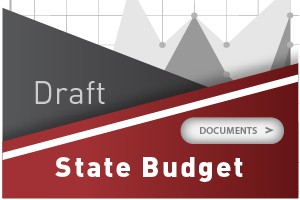Draft 2019 State Budget of the Republic of the Bulgaria Law and the up-to-date 2019 – 2021 Medium-term Budget Forecast
The Ministry of Finance has published the draft 2019 State Budget of the Republic of the Bulgaria Law and the up-to-date 2019 – 2021 Medium-term Budget Forecast which offers the grounds thereto.
The updated budget forecast presents the medium-term economic prospects and priorities of the government as well as the main parameters of the next year's budget framework. A new point in the content of the forecast is the inclusion of more information in the presentation of spending policies - both fiscal indicators and key indicators to measure the extent of their implementation.
Key objectives remain to preserve fiscal sustainability and to pursue a coherent, transparent and predictable fiscal policy that contributes to improving the business environment, encouraging investment and stimulating labour market developments to achieve economic growth and employment, complying with common EU rules.
This forecast maintains the budget balance targets set out in the GBA for the period 2019-2021, a deficit of 0.5% of GDP for 2019, and a balanced budget position in 2020, which remains unchanged in 2021.
The revenue and expenditure policies in this forecast are a continuation of the midterm budget forecast for the period 2019-2021, and for the new ones, both the macroeconomic aspects and the expanded fiscal capacities to provide funding for priority sectors and to realize horizontal measures affecting the budget sphere.
Expressed as a percentage of GDP, the revenue for the period 2019-2021 shows a downward trend from 37.7% to 35.8%, while in nominal terms they increase from BGN 43 857.0 million in 2019 is expected to reach BGN 47 582.3 million in 2021.
The tax policy has taken into account the effects of the current changes in tax legislation related to the implementation of measures to improve collection, stimulation of economic development, reduction of the administrative burden and transposition of the provisions of the European law in the field of taxes. In the mid term, it is envisaged to maintain the low corporate tax rates and tax rates on incoem of individuals, which contributes to increased economic growth and has a positive impact on labour supply and demand.
In the area of social policy, the budget envisages funds amounting to: BGN 40.4 million additional for each year of the forecast period (50% more compared to the funds in 2018) for targeted heating aids for social protection and equal opportunities; BGN 150.0 million additional for each year of the forecast period to ensure the financial framework of the draft Disability Act and the Draft Personal Assistance Act upon their adoption; BGN 7.0 million in connection with the introduction of a new type of monthly allowance for children without the right to a survivor's pension from a deceased parent, according to the amendments to the Family Allowances Act for children, with the amount of the aid for 2019 being BGN 115.
Policies for accessible and good quality education are implemented through a holistic integrated approach based on the tied and coordinated actions of the institutions at national and local level. The state budget funds are mainly focused on the four pillars for financing the system, in accordance with the Pre-school and School Education Act, as well as on the financing of the training of students and PhD students, determined on the basis of a comprehensive assessment of the quality of training.






